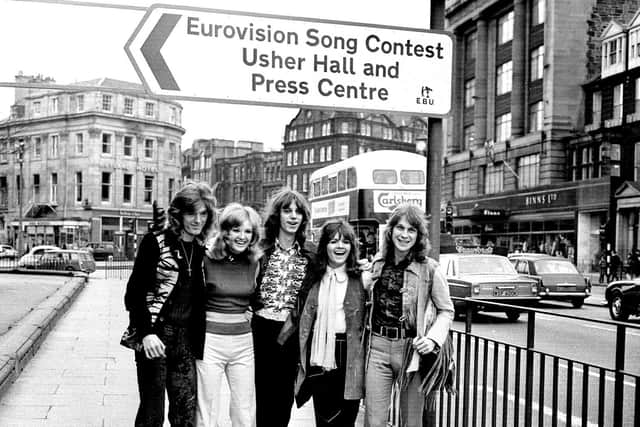Nul points for music but Eurovision juggernaut is impossible to resist
and live on Freeview channel 276
I grew up in the days when it was an achingly dull, stiff, formal event with all the spectacle of Christmas cracker failing to go bang.
Production values were awful, and the entries utterly dismal.
Advertisement
Hide AdAdvertisement
Hide AdThere is no doubt that, as a spectacle, Eurovision - the ‘Song Contest’ bit seems to have fallen off much like Emmerdale lost its farm from its titles - has escalated to gobsmacking new heights, and I get that being there must be like stepping inside a giant, sparkly ball.


But musically, it was, and remains, utterly naff.
That there are even semi-finals is something that boggles my mind - the musical equivalent of Stranraer playing Berwick Rangers on a wet, windy January night for the right to go head to head with Arbroath.
I guess that underlines the Eurovision expansion in recent years. A show that once fitted comfortably into the Usher Hall in Edinburgh now needs the biggest indoor arenas Europe can offer. We’re talking circa 20,000 seats and enough glitter to carpet every street for as far as the eye can see.
Wherever it goes, the hospitality travel smacks it lips and cranks up the room rates faster than anyone ever yelled boom-bang-a-bang.
Advertisement
Hide AdAdvertisement
Hide AdSo Glasgow’s loss is Liverpool’s gain as the corporate juggernaut rolls into town. The money they rake in is in proportion to the eyewatering costs involved in staging this giant songfest where the vast majority of the entries can’t be recalled barely ten minutes after the credits have rolled.
Much like the Grand National and Miss World, Eurovision was an annual telly date in our house in the 1970s, largely because there really wasn’t much else to watch. It was either that or the Wheeltappers and Shunters. Maybe old Colin Crompton should have hosted Eurovision instead of Terry Wogan - that’d have been fun!
The music of that era is seared into my brain - Brotherhood Of Man, The New Seekers, The Shadows, Mary Hopkins, Johnny Logan, Cliff, Lulu and Lindsey DePaul and Mike Moran - as are the annual debates over why don’t we ask that nice and very popular David Bowie or Elton John to fly the UK flag?
I also used to be fascinated by the juries, or rather, who got to be on them. Was there a secret application process open only to Rotarians and Round Tablers? Did they have to sit an exam?
Advertisement
Hide AdAdvertisement
Hide AdI imagined them all sitting round in formal tuxedos, scorecards in hand while sipping sherry behind closed doors and nodding in appreciation at the catchy if utterly incomprehensible number from Belgium. Alas, one more life goal that seems set to gloat on by …
In the end, I guess Eurovision is harmless escapism - and an excuse we’ve all seized upon to have a wee party.
Fifty-plus years on from the days of watching Katie Boyle’s oh-so formal hosting, I find myself sitting down to watch it for reasons that I still can’t explain. Musically, it makes my skin itch.
But it is an irresistible juggernaut of glitz. As the daleks – another 1970s stalwart – often noted, resistance is futile.
